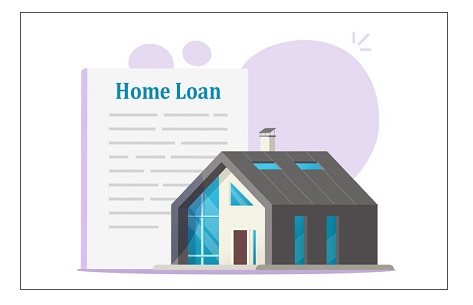Tag: home loan

Joint home loan is one of the best financial products by lending institution to hedge their mortgage risk. Most of the lenders insist on joint home loan these days, even if the property to be pledged is bought in a single owner’s name. The key advantage of taking this loan is the home loan tax benefits and the other thing that is quite interesting, adding your earning or non-earning spouse as a co-applicant. If you “Apply For Home Loan“ jointly, it makes your repayment capability higher. As every cloud has a silver lining, so do the joint home loan. Let us understand the pros and cons of this loan which are mentioned below:
Advantages of Joint Home Loan
♦ Higher loan quantum: You can apply for loan jointly with your partner, siblings or children to get your loan quantum increased substantially. Every lender sees the borrower’s net monthly income and then finalizes the loan money to be disbursed. Usually, the lending institution would offer a loan on which the monthly installment could be as high as half of the monthly income.
♦ Tax benefits: If your co-applicant is co-owner of house with you, then you can both claim the tax benefits. There is deduction from the taxable income on both the principal repayment as well as interest to be paid, hence, bringing down the overall tax liability of borrowers. Therefore, a home loan jointly allows co-applicants to double the tax deduction benefits from a single housing loan.
♦ Flexible repayment: If you are applying for home loan jointly, it is not necessary that both the applicants have to repay equally towards the principal amount and interest payment. It entirely depends upon the borrower to decide how much each of the borrowers contributes towards EMI.
Disadvantages of Joint Home Loan
♦ Delayed Documentation: As the two applicants “Apply For Home Loan Online“ or offline, so lender will take more time to complete the documentation check. This time lapse occurs as authorities take longer time to ensure that documents submitted by applicants are genuine and not forged. The entire process of document verification is repeated two or three times depending upon the number of co-applicants who have applied for loan.
♦ Impact on CIBIL score: As the joint home loan gives you the advantage of flexibility on repayment but it also have a disadvantage because if any of the two applicants defaults on repayment then the credit score of both of the borrowers would face the brunt as any default on the EMI could negatively affect your credit history.
♦ Divorce or Demise: In case if the co-borrower decides to move out of a loan due to divorce then it is the responsibility of first applicant to repay the whole loan. In other case, if one of the co-applicants passes away then the surviving spouse have to take the charge of repaying the entire loan amount. It is advisable to avail separate life insurance policies to decrease the financial load on one applicant in case of demise or separation.

Nowadays, home loan market is growing with every passing day and easily available to the common masses. Though it is easily accessible, therefore, one should be aware of the loan quantum that can be approved to him/her. Thus, it is advisable to research properly and understand completely about the home loan eligibility. So, before you “Apply For Home Loan“ it is highly recommended for you to check your eligibility as well as affordability.
Loan eligibility is a term given to specify your affordability. It reflects how much loan money you will get through home loan. The eligibility is determined by various factors which include borrower’s age, income, employment, CIBIL score and many more depending upon the norms of particular lending institution. The factors that help in enhancing the home eligibility involves a good repayment history, regular source of income, co-applicant/co-borrower, low credit utilization ratio etc.
There are some tips and tricks to increase your home loan eligibility and to secure a loan quantum that you desire. In this article, we are discussing some tips to enhance your eligibility which is mentioned below:
→ Adding a co-applicant: Signing a home loan agreement with your spouse or your partner as a co-borrower can increase your eligibility. By doing so, you can also get approved for higher loan quantum from the particular financial institution. As a matter of fact, co-borrower can be your life partner, your sibling or any other family members. Adding co-applicant can increase your EMI affordability and lender find it more secure to lend you the money. Some of the lenders also get ready to lend a loan at comparatively low rate of interest.
→ Adding second source of income: Another source of income can help you to increase your eligibility for home loan. A second source of income can be your rental income, part-time job, rent from farms, share etc. Adding any of these on top of your monthly income reflects your good financial health and hence, lending institution find it secure to approve you a higher loan quantum.
→ Improve your credit score: It is one of the key factors that decide your loan approval or rejection either you “Apply For Home Loan Online“ or offline. It is one of the most important components which decide the loan money which will be approved for you. Lenders find it secure to lend money to the person having good credit score as it indicates good repayment history of yours. Therefore, if you are planning to take a home loan, check your CIBIL score first. If you find it low, then try to improve it.
→ Repay your existing debts: The repayment of existing debts not only help you to build a good CIBIL score but also help you to decrease the credit utilization ratio which further enhances your home loan eligibility. Moreover, having some additional savings and investments can also add up to your eligibility.
Hence, these are some of the tips and tricks that you can follow to increase your “Home Loan Eligibility“ and make the loan journey easy and convenient for you.

A stress-free life is a dream of many individuals, where everyone wants their own home outright and pockets full of cash. Well, it is not easily possible but you can achieve this dream just by following good financial habits. One of the easiest ways to achieve your goal is by paying the mortgage and loans with high interest rates faster. Paying off your loan faster will help you reduce your financial burden. Moreover, it will help you to get safe from default so that you do not have to spend on late payment charges.
Home loans are the big liabilities which always stretch from 20 to 30 years for most of the borrowers. During the loan tenure, the borrowed principal amount becomes much more as the huge amount of interest rate is added to it. The home loans have lower interest rate so people often go with a long tenure but rate of interest keeps on adding for a long time which becomes double or even more than the borrowed amount. Therefore, the best way to get rid of this burden is to pay your “Home Loan“ as soon as possible. Here are the possible ways by which you can pay off your home loan faster.
→ Look beyond big banks: Do not choose the renowned financial institutions as small lenders can do the wonder for you. The small lenders may provide you more personalized service and some festive offers as well which may include longer loan tenure, lower interest rates and ongoing fees. Some of the other advantages which one can get with NBFCs and small lenders can be higher lending ratio, minimal documentation and low processing fees.
→ Make frequent payments: Most of the lenders allow frequent payments to the borrower. You just need to check for this while selecting a lender. You can ask for such facility and can make payments after paying the EMI. The interest rate on home loans is calculated on daily basis and making the frequent payments can help you to reduce the burden of interest which you will be paying over the tenure of your loan.
→ Make a big down payment: Making a huge down payment on your home loan reduces the principal amount which leaves you with fewer burdens. It results in paying less interest rate, therefore overall repayment. A big ticket down payment reduces your debt obligation in comparison to other home loans. The repayments become much easier when you have a low principal amount.
→ Home loan refinancing: If you found something more convenient and affordable after reviewing your home loan, the home loan refinancing can help you to grab what suit you the best. Try to negotiate the interest rate with the existing lender or go with a new lender who offers you a low interest rate as it can save you a lot of money. Use a home loan EMI calculator for detailed calculation and to know the total borrowing cost which suits your requirements.
Some quick tips to save money:
• Save sufficient amount of funds to make down payment before you “Apply For Home Loan“.
• Opt for a loan quantum which could be easy for you to repay.
• Pay your monthly installments and credit card bills on time.
• Utilize your bonus or other profits from your investments to make partial prepayments.

Financial goals are the savings, investment or expenditure targets you plan to achieve over a set period of time. The phase of life or the age you’re in usually determines what type of financial goals you wish to achieve. For example, if you’re a teenager, it may be an easy short-term goal like saving for a new pair of branded jeans or something more challenging like saving for a bike. On the flip side, an individual with a growing family would have a long-term goal of going from renting a house to owning his/her own home by taking “Home Loan“. Moreover, saving for a child’s higher education and saving for your own retirement are the other popular financial goals.
How a one can set the financial goals?
Setting the financial goals is not an easy steps, one has to be determined about his/her decision. So, we are there to help you by suggesting some steps to set the financial goals.
• Figure out what matters to you at first. Put everything, from the practical and crucial to the unusual and distant, on the table for inspection and evaluation.
• Examine out what’s within reach, what will take a little time, and what must be part of a long-term strategy.
• Apply a SMART goal strategy on yourself. Make certain that your ambitions are Specific, Measurable, Achievable, Relevant, and Timely.
• Create a realistic monthly budget. Get a strong hold on what’s you saving and what’s you spending, and then work on it to address your goals. Use your budget to plug leaks in your financial boat.
• Your realistic and practical layout and water-tight budget will show at least a handful of leftover money. How much that money is, get it automatically directed into a separate account designed to complete the first couple of things on your list of priorities.
• Monitor your progress with passing time. Ensure yourself that you are hitting the set benchmarks. If not, take some time in that case to re-evaluate what is wrong.
How to achieve the financial goals?
The best way to achieve your financial goals is by making a layout that prioritizes your savings and investments. When you evaluate your own expenses and savings, you’ll discover that some are wide and distant-reaching goals, while others are narrow in aspect. Your goals can be separated into three categories according to time period:
• Short-term financial goals take a couple of months to achieve. For instance, it may include taking a holiday trip, buying a new gadget or paying off a particular debt by taking “Personal Loan“.
• Mid-term financial goals can’t be achieved in a short time and can take too many years to get accomplished. To illustrate, it may include purchasing a dream car, finishing a degree course or certification, or paying off your existing debts.
• Long-term financial goals (more than five years) may take long years to get accomplished and, as a result, they require longer commitments, true determination and often more money. To exemplify, it might include buying own home, saving for a child’s higher education, or for a comfortable retirement.

Loans can be a savior during an emergency and they don’t have to trap you in debt over a period of time, if you manage your finances well. Even, you can get tax benefits from certain kind of loans. It is true that you could get some great tax deals on your loans. As per the income tax, 1961, government has levied some tax benefits that have been provided been provided to the borrowers to reduce the burden of tax repayment. Let’s have a look on some common loan options that offer tax benefits.
Home Loan: It is one of the biggest loan liabilities that a borrower can avail. The loan quantum and tenure can be high on “Home Loan“ but the tax benefits that a customer reaps on it are pretty good too. It can benefit an individual in two ways. Firstly, the amount paid towards the principal qualifies a tax deduction under Section 80C of the Income Tax Act while another benefit comes from a deduction in the amount paid as interest on the loan. If one has his/her spouse as co-borrower, the deduction can be claimed by each of you. The tax benefits on home loan can only be availed after the construction is completed.If you are planning to sell your home within five years from the date of taking loan then say goodbye to tax benefits.
Study Loan: The government has put various measures to promote higher education in youth and people have become aware to venture out of the country to study. Nowadays, the cost of professional courses such as medical and engineering is still sky-rocketing in India as well as abroad. This is when study loans come in handy as they pave the way to your future. To enjoy the perks of tax benefits on your Study Loan, the loan should be borrowed from scheduled financial institution. The tax benefits to the borrower availing an education loan for pursuing the higher studies come under the Section 80E of the Income Tax Act. This advantage can be availed for maximum of eight years or on the tenure, whichever is applicable.
Personal Loan: It is a type of unsecured loan that offers a plethora of requirements. This loan is a lot easier to obtain without stating the purpose of borrowing it. The most common reason behind applying a “Personal Loan“ is medical emergency, debt consolidation, travelling, higher education and many more. Most of the people tend to miss out the tax advantages on it as not many know this benefit of loan. Generally, the principal amount and charges of interest paid towards loan cannot be deducted for tax exemptions but you can claim the benefits if you are using the borrowed amount for home renovation.
Now you have a guide that if the loans are handled responsibly, they can help you plan your finances in a better way. The tax benefits are the fantastic offers provided on Home Loan, Study Loan and Personal Loan. If you are looking for a loan from above mentioned categories, just give them a shot.

Nowadays loans are the survival tool for many individuals as they get you the money at a time of emergency in a hassle free manner. It gives you the benefit of borrowing money with pocket friendly and “Affordable Rate Of Interest“ rather than asking family or friends for monetary help. Another advantage is repayment options where you are in favor of repaying the loan quantum as long as per choice in easy monthly installments known as EMI. One should know about the basic rules to keep in mind before applying a loan to make the loan journey more comfortable.
Affordable EMI of loan: A smart borrower never bites off more than he/she can chew comfortably. So one should take care that loan EMI should never burn a hole in your pocket. Our loan EMI should not exceed from 30% of your total monthly income. If loan to income ratio is in limit, it is always acceptable to lender. If you are unable to maintain the EMIs then it will surely give you a financial burden and mental stress and you will not be enable to focus on other financial goals.
Compare each and everything: Either it is a basic product or any other financial products, we all get active in terms of bargaining and finding the best deal available in market. There are number of banks and NBFCs offering different kind of financial services at different interest rates. The rate of financial product varies from one lender to other. Hence, it is important to compare the lenders and what benefits they are offering.
Do the calculation: The thought of borrowing more money than you need is tempting itself. It might seem to be a smart option but it will generate a burden for rest of the life. Though many of lenders offer money up to higher limits but we should not jump at this thought. It is always advisable to “Apply For a Loan“ and borrow the money equivalent to your requirement and can be easily repaid. Therefore, calculate your finances and then borrow accordingly.
Short tenure: The EMI is lower in the case if borrower goes for a long term loan and can enjoy the tax breaks but the longer tenure ends up in paying more on interest, however, tax benefits brings the effective cost of loan down. Availing a short term loan may not always be possible for everyone because in this EMI is always high. But having sufficient income and benefits from bonuses and incentives, it is the best option to repay your loan in short tenure with increasing EMI.
Check terms and conditions carefully: When you avail a loan, you have to sign a loan agreement consists of terms and conditions regarding the loan and many legal clauses about that particular financial tool. In case you default on loan, lenders have the full authority to take any appropriate action against the borrower but under those terms and conditions.
